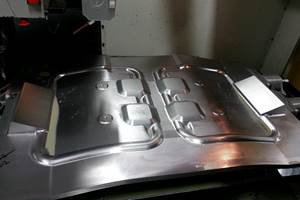Screw Machine Shop Delves Into E-Business Network
Within a span of 2 months, this company lost three customers that represented a considerable amount of revenue. How would the screw machine shop rebound? How would the company be able to diversify its customer base without devoting time to futile sales efforts? The answer to broadening its clientele was found within a Web utility.
Share






Alexander Graham Bell once said “when one door closes, another door opens.” However, this is not exactly what a company wants to hear when one of its biggest customers—representing roughly half of its business—files for bankruptcy. That is exactly what happened to Vern’s Machine Company, a screw machine shop nestled in upstate New York, when Garden Way Incorporated filed for bankruptcy in 2001.
In fact, within a span of 2 months, the Marion, New York company lost three customers that represented a considerable amount of revenue. Vern’s found itself in quite a predicament. How would the screw machine shop rebound? How would the company be able to diversify its customer base without devoting time to futile sales efforts? For Vern’s, the answer to broadening its clientele was found within a Web utility.
In business since 1969, Vern’s employs 20 staff members and operates 53 Brown & Sharpe screw machines. Although screw machining is the company’s primary specialty, it also carries out prototype turning and light assembly work. Among the products Vern’s produces are copy products, microchips for feeders; lawn mower components; parts for airplanes and automobiles; and sewing, medical and dental equipment.
Owner and President Allan Visingard describes his shop as having a “down-home family atmosphere.” It is committed to looking after both its employees and its customers. Mr. Visingard also characterizes his company as deeply “customer oriented,” as made evident by its available stocking programs.
Somewhat disillusioned with the traditional sales model in the global context, Mr. Visingard went online to search for other options to expand his business. One particular resource led him to MFG.com, based in Atlanta, Georgia (formerly known as mfgquote.com). It was shortly after the advent of MFG.com that Mr. Visingard began using the online virtual marketplace.
The Web-based supply chain network provides comprehensive online sourcing for custom manufacturing services. Buyers post RFQs (request for quotes) at no cost; suppliers will then bid for business that matches their particular expertise and capabilities.
As described by Mitch Free, president/CEO/founder, his brainchild is basically “an industrial dating service.” It provides a neutral format for engineers, suppliers and job shops to locate the appropriate expertise and capacities to get the job done.
The self-professed “industrial matchmaker” explains that the service is intended as a tool to empower companies to diversify their clientele. Each MFG.com user has a profile to manage. This serves as publicity for the company, as it is optimized with popular search engines. Users can upload videos, brochures and other items to give those perusing the site an idea of the shop’s capabilities or even samples of previous jobs.
“We offer complete reporting via a search engine,” says Mr. Free. “This provides shops with tangible evidence to help them discern how many people have visited their profiles.”
“We often receive calls from people who have viewed our profile on MFG.com,” says Mr. Visingard. “Users can also evaluate our ratings.” (Similar to a forum such as eBay, users rate the suppliers and vice versa.)
Prior to using MFG.com, Mr. Visingard estimates that his shop dealt with roughly 60 customers. As a result of using the Web utility, this figure has grown to 197. Vern’s now ships to Ireland, Hong Kong, Mexico and other countries, whereas prior to using the utility, it relied heavily on a local customer base. Mr. Visingard approximates that one-time customers comprise about 60 percent of his business, with the remaining 40 percent represented by repeat customers. In addition, this service has afforded Mr. Visingard more freedom to pick and choose jobs, whereas before, he was less discriminating.
Overall, Mr. Visingard is pleased with the service; however, he does relay one caveat: “The tool is not a golden egg,” he says. “It requires a bit of work and research. Some buyers are searching for the cheapest bid, while others want established suppliers. The only downside is just the knowledge that others are looking—the competition.”
Related Content
Rethink Quality Control to Increase Productivity, Decrease Scrap
Verifying parts is essential to documenting quality, and there are a few best practices that can make the quality control process more efficient.
Read MoreHow to Mitigate Risk in Your Manufacturing Process or Design
Use a Failure Mode and Effect Analysis (FMEA) form as a proactive way to evaluate a manufacturing process or design.
Read More4 Rules for Running a Successful Machine Shop
Take time to optimize your shop’s structure to effectively meet demand while causing the least amount of stress in the shop.
Read More4 Tips for Staying Profitable in the Face of Change
After more than 40 years in business, this shop has learned how to adapt to stay profitable.
Read MoreRead Next
Machine Shop MBA
Making Chips and Modern Machine Shop are teaming up for a new podcast series called Machine Shop MBA—designed to help manufacturers measure their success against the industry’s best. Through the lens of the Top Shops benchmarking program, the series explores the KPIs that set high-performing shops apart, from machine utilization and first-pass yield to employee engagement and revenue per employee.
Read MoreAMRs Are Moving Into Manufacturing: 4 Considerations for Implementation
AMRs can provide a flexible, easy-to-use automation platform so long as manufacturers choose a suitable task and prepare their facilities.
Read More




















